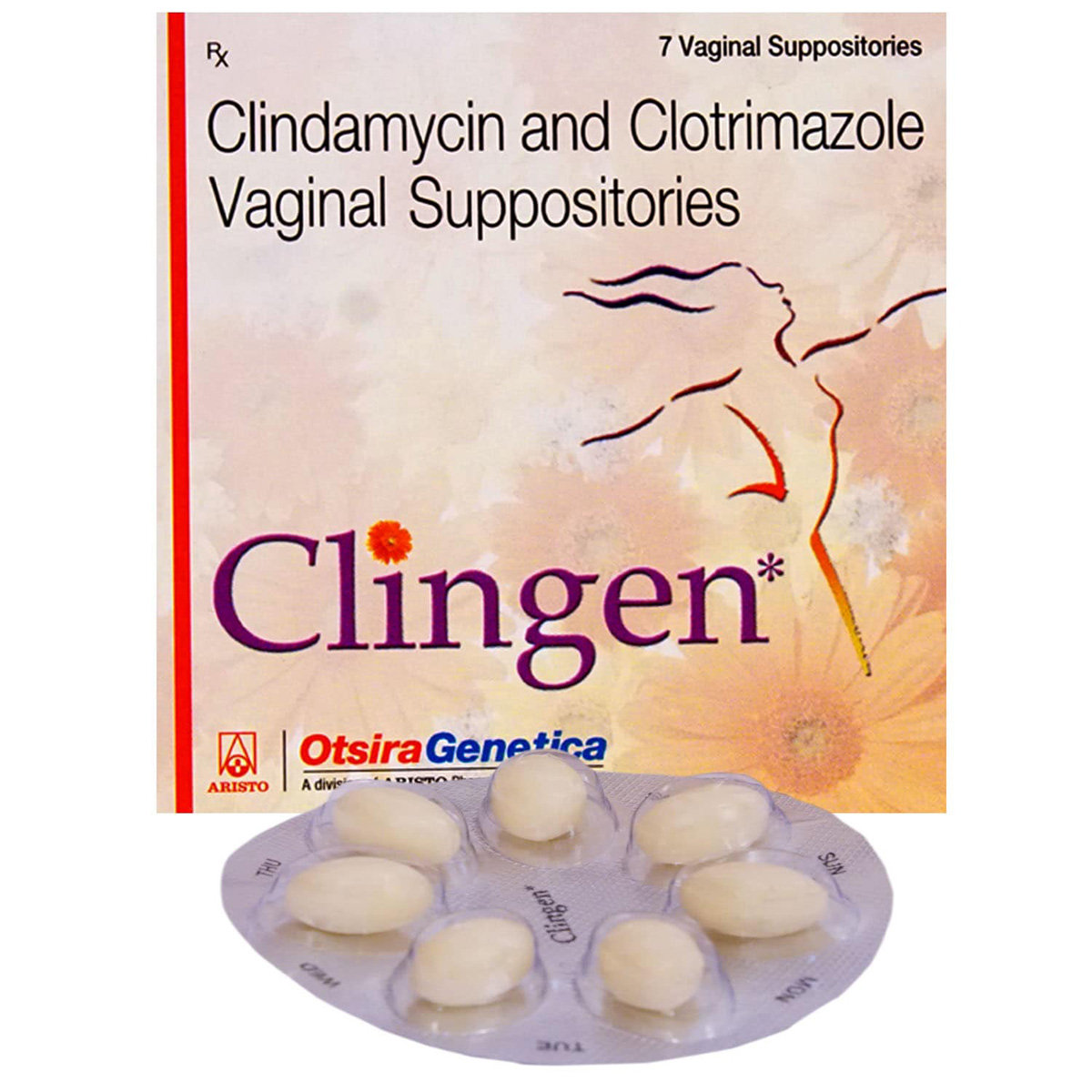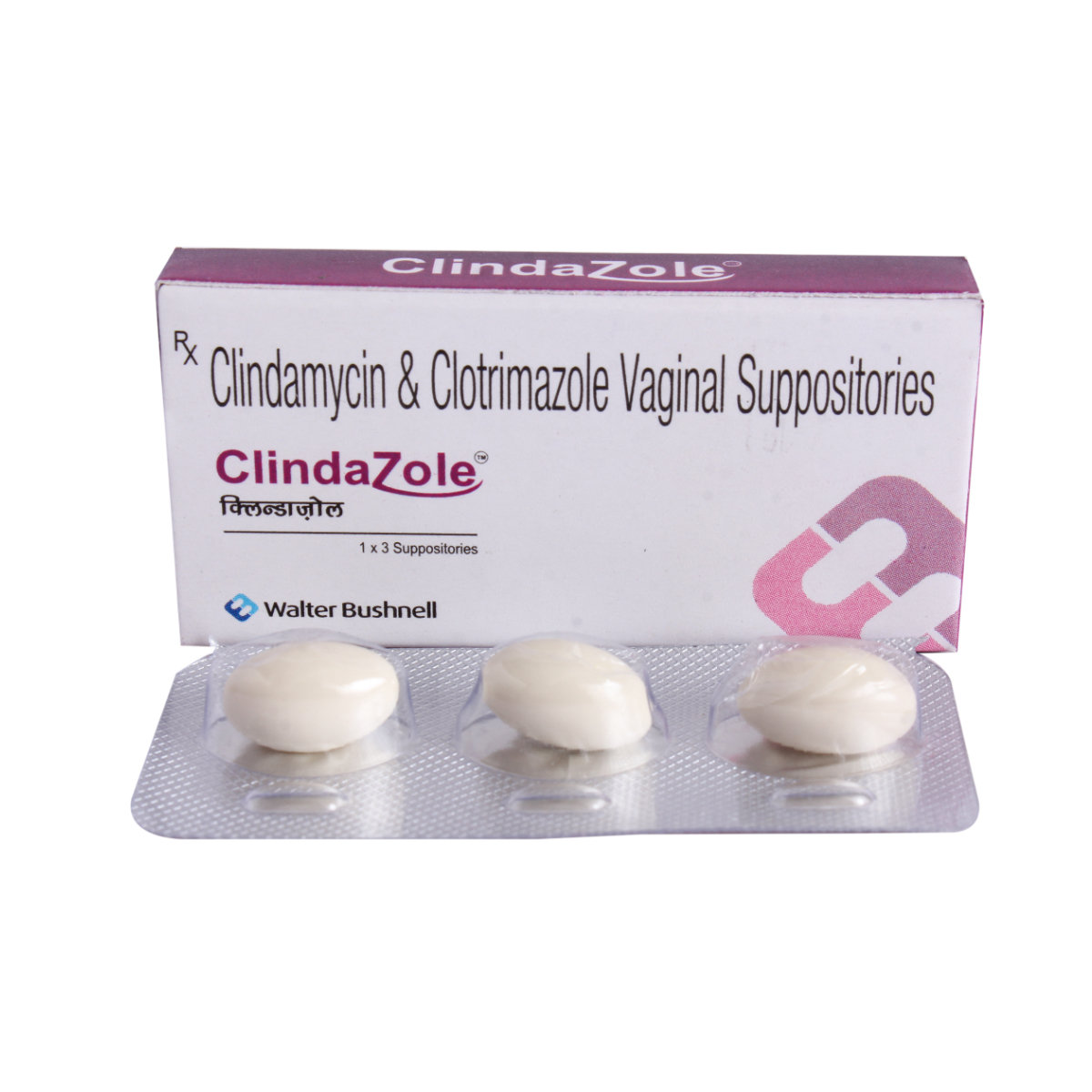- Home
- Sesil 100mg/100mg Suppository
Sesil 100mg/100mg Suppository Substitute
Sesil 100mg/100mg Suppository Substitute
Medicine Composition:
CLINDAMYCIN-100MG+CLOTRIMAZOLE-100MGAll Substitutes & Brand Comparisons
RX
Out of StockMetrogyl V 100mg/100mg Vaginal Suppository
J B Chemicals & Pharmaceuticals Ltd
₹87
(₹11.19 per unit)
11% CHEAPERRX
Out of StockAPPLYGEN SOFTGEL VAGINAL SUPPOSITORIES 7'S
Ronyd Healthcare Pvt Ltd
₹119.5
(₹15.36 per unit)
21% COSTLIERRX
Clingen Vaginal Suppostories 7's
Aristo Pharmaceuticals Pvt Ltd
₹164
(₹21.09 per unit)
67% COSTLIERRX
Clinsup-V Vaginal Suppository 7's
Resilient Cosmeceuticals Pvt Ltd
₹195.5
(₹25.14 per unit)
99% COSTLIERRX
Out of StockVezynda Soft Gelatin Suppository
Demax Biotech Pvt Ltd
₹87
(₹26.1 per unit)
107% COSTLIERRX
Out of StockCanuzi-100 Softgel Vaginal Suppositories 7's
Medibyte
₹210
(₹27.0 per unit)
114% COSTLIERRX
Clindazole Vaginal Suppositories 3's
Walter Bushnell
₹185.5
(₹55.67 per unit)
341% COSTLIER

When Should You Consider Switching from Sesil 100mg/100mg Suppository?
Patients may explore substitutes in the following scenarios:
- High monthly cost of Sesil 100mg/100mg Suppository
- Non-availability in local pharmacies
- Generic recommendation by a doctor
- Side effects or better tolerability with alternatives
What to Know Before Switching
Before you switch from Sesil 100mg/100mg Suppository to another medicine, here are some important points to keep in mind:
Same salt, different brands:
Most substitutes contain the same active ingredient - CLINDAMYCIN-100MG+CLOTRIMAZOLE-100MG, but the fillers, coating, or manufacturing quality may vary slightly.
Consult your doctor first:
Even if the salt is the same, your doctor can confirm if the substitute is right for your condition, dosage, and health history.
Watch out for allergies or reactions:
Some people may react differently to certain brands due to inactive ingredients. If you notice any side effects, inform your doctor immediately.
Price ≠ effectiveness:
A lower-priced substitute doesn't mean it's less effective. Many generic medicines work just as well as branded ones.
Check the dosage form and strength:
Always match the substitute’s strength (e.g., 5mg, 10mg) and form (tablet, capsule, syrup) with what your doctor prescribed.
Uses
Medicinal Benefits
Sesil 100mg/100mg Suppository is used to treat vaginal infections like bacterial vaginosis (BV), candidiasis, and trichomoniasis. It comprises two medicines: 'Clindamycin' (antibiotic) and 'Clotrimazole' (antifungal). Clindamycin is an antibiotic drug and works by inhibiting bacterial protein synthesis, which inhibits bacterial growth. It shows a bacteriostatic effect, which stops bacterial reproduction. Clotrimazole is an imidazole antifungal medication that stops the growth of fungi by causing damage and leakage to the fungal cell membrane. Together Sesil 100mg/100mg Suppository treats vaginal infections caused by bacteria, yeast and parasites preventing white discharge, itchiness and inflammation in the genitourinary area.
FAQs
The substitutes of Sesil 100mg/100mg Suppository contain the same active salt(s) - CLINDAMYCIN-100MG+CLOTRIMAZOLE-100MG. However, they may differ in price, manufacturing quality, and inactive ingredients. Speak to your doctor to find a suitable option.
Switching to a generic substitute medicine in the place of Sesil 100mg/100mg Suppository is often possible if it has the same salt, strength, and dosage form. But always check with your doctor before making any changes to your medication.
Generics versions of Sesil 100mg/100mg Suppository are typically more affordable because they don’t include the original brand's research, development, and marketing costs. They contain the same active ingredient and are approved for safety and effectiveness.
Most people don’t notice any difference. However, some may react to different fillers or coatings. If you notice any unusual symptoms after switching, consult your doctor.
Make sure the new medicine has the same active salt, strength, dosage form. Always confirm the change with your doctor or pharmacist.
Substitutes of Sesil 100mg/100mg Suppository meet the same safety and efficacy standards as Sesil 100mg/100mg Suppository, but small differences in absorption or formulation can exist. A doctor can help you choose the right one for your needs.
Yes. Substitutes of Sesil 100mg/100mg Suppository may vary in color, size, or shape due to differences in manufacturing and branding, but this does not affect how they work.
Yes, it’s generally safe to switch between multiple substitutes of Sesil 100mg/100mg Suppository if they have the same salt and strength. However, always inform your doctor so they can monitor how your body responds.
Yes, many people safely use substitutes of Sesil 100mg/100mg Suppository for long-term treatment. Just ensure it’s done under medical supervision.
If your symptoms stay under control or lab results remain stable, the substitute for Sesil 100mg/100mg Suppository is likely working well. Regular follow-ups with your doctor are important.
Absolutely. Even with the same salt, small differences can affect how your body responds when switching from Sesil 100mg/100mg Suppository to its substitute. Always consult your doctor before switching.




